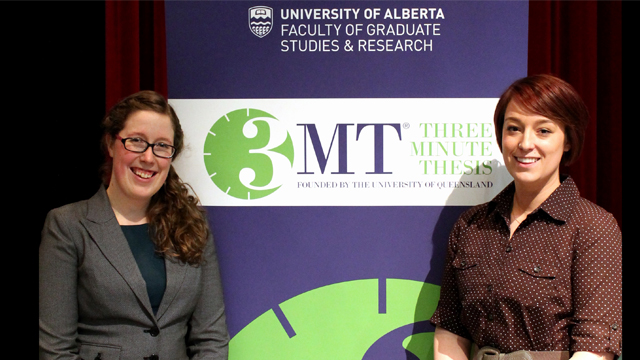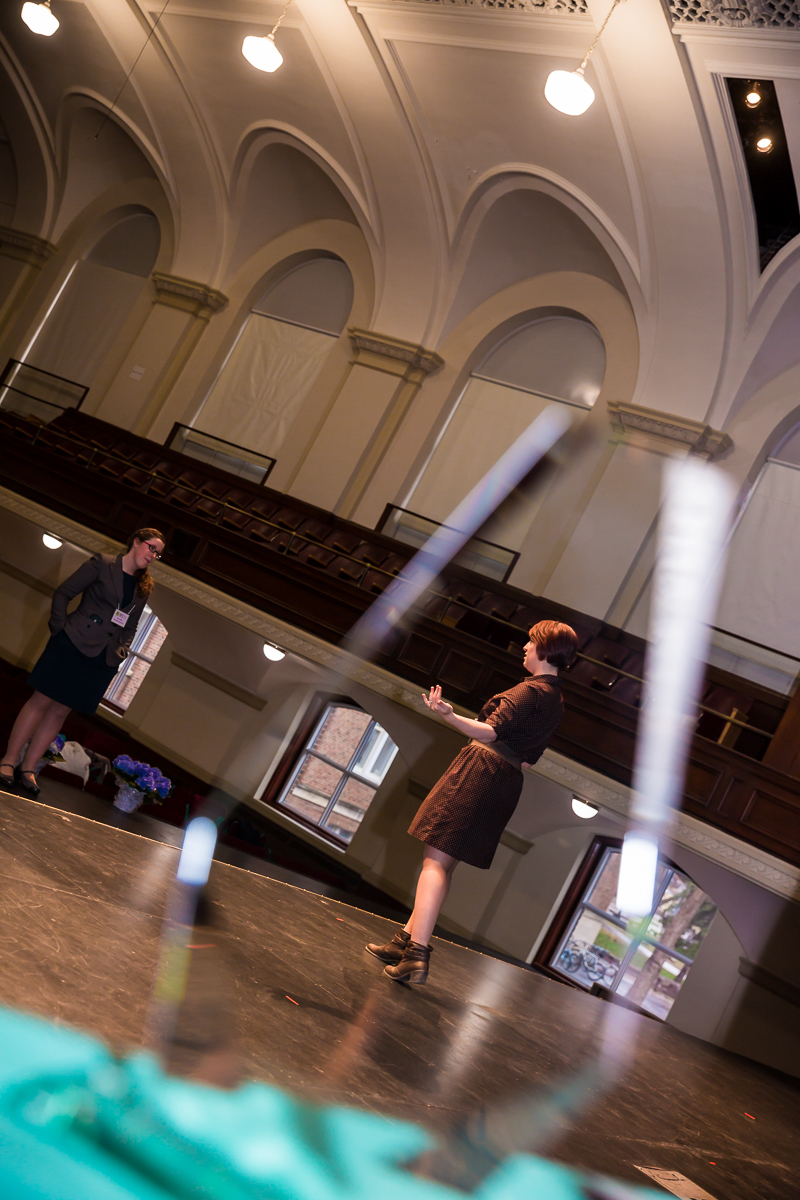
Autumn Watkinson (right) poses with friend, labmate, and fellow 3MT finalist Valerie Miller (photo credit: Stephanie Chute-Ibsen)
To find out what it's like to compete in the Three Minute Thesis (3MT), we asked Autumn Watkinson, last year's UAlberta winner who went on to place second in the Western Finals and compete in the 3MT Canadian national competition, about her journey.
Autumn, how did you write your 3MT?
I approached the writing of my 3MT in stages. I tried a few exercises before I even attempted put pen to paper. I imagined what I might say to explain my research to someone who didn't know anything about the discipline I study - ecology and land reclamation. I imagined what I might say to someone who was an expert in my field. I asked myself, if these people walk away from that conversation retaining only one piece of information, what would I want them to remember? After letting those thoughts roll around for a couple days I sat down and started writing out points in sub-headings to help structure my talk. There were many, many versions of the talk which came from vetting it through my family (non-specialized audience, familiar with my research), and friends of family (non-specialized audience, not familiar with my research), my labmates and supervisors (specialized audience familiar with my research) and classmates (specialized audience, not familiar with my research). At each stage I asked if there were any issues with language, clarity, or other... and tried to address these comments while keeping the 3MT pitch true to my research and my personality.
 How did you practice your presentation?
How did you practice your presentation?
I practiced A LOT and in the early stages I did this alone and with my friend, labmate and fellow 3MT finalist, Valerie Miller. It was a good partnership because, being labmates and having worked on each other's projects previously, we were familiar with each other's work and could offer constructive feedback on focusing the writing of our talks. To ensure the speech came out 'naturally' I recorded myself delivering my talk. I also recorded myself so that when I was commuting back and forth from school I was able to listen to the recording and practice in my head (and not look like a crazy person talking to myself all the time). My supervisor allowed me to practice on her capstone class and I also practiced in front of my seminar class. Presenting in front of individuals and small groups allowed me to get feedback again, but the practice in front of larger groups helped me get over my nerves! Near the competition time, when I practiced I would envision myself in the room, on the stage where I would be presenting, and that helped me get over some nerves as well - I made sure to visit the venues before the competitions.
Did your department have a competition or did you register for the semi-finals?
I'm in the Department of Renewable Resources. We didn't have a departmental competition so I registered for the semi-finals on my own.
Once you won a spot for the 3MT finals, what were the next steps to perfect your presentation and slide?
Once the semi-finals were complete and I found myself in the U of A finals, I continued to practice with Valerie, because she also won a spot to the finals! All finalists were also given the opportunity to have a one-on-one coaching and group feedback session from FGSR, which was very helpful. We were also able to contact the FGSR coaching team for advice as we prepared for the finals. At this stage of the competition, it became easy to start wanting to change everything because of other people's opinions, but we were choosy about what we did or did not change because if you incorporate all suggested changes your pitch can end up sounding nothing like your own.
What was it like to win and compete in the 3MT Western Finals? The 3MT Canadian Nationals?
It was a bit of a shock, really, to win the U of A competition. I think I stood there on the stage next to Valerie for a full second or two before I was like, "Okay, this is real". There were so many great talks at the U of A, it was an honour just to be included in the finals, let alone win. To compete at the 3MT Western Finals was a wonderful opportunity to meet other graduate students and learn about their research. I felt quite a bit of pressure and nerves going up to the competition because I wanted to represent the U of A well. For myself though, it was the last time I would compete in person so I wanted to really enjoy it for what it was. I was surprised when my name was called and I realized I would be competing at the 3MT Canadian Nationals. But this time there was no pressure, because the Canadian finals were hosted over the internet, and the talk I delivered at the Western Finals was recorded and used as my entry. It took a while to get my head around the idea that anyone in the world was going to be able to watch my 3MT video and hear about my research (what a great honour and opportunity!).
What were the benefits of competing? What did you get out of it?
The benefits of competing were numerous. The most obvious is that I improved my science communication skills (an important skill that is under taught in research institutions). The process also allowed me to see my research in a more focused light and that helped me to re-focus my experimental design and writing. I became aware of some of the problematic ways I had described aspects of my work. I became a more confident public speaker. I became more embedded in the graduate student community. I was given networking opportunities. I made friends. Most importantly, the 3MT gave me a platform from which to tell people at U of A, nationally, and globally about my research. I used the three minutes I was given as an opportunity to try to get people to care about a cause that I feel very strongly about (and when you see it like that and not a competition, I think things become more enjoyable).
Would you recommend competing in the 3MT to other grad students?
I would absolutely recommend competing in the 3MT to every other graduate student. Every single one. Even if the student doesn't want to compete, I would highly recommend the exercise of trying to write the 3MT speech because you will still focus your research this way (and you have a pitch prepared if someone catches you in an elevator for three minutes and wants to know what you research!).
Watch Autumn's video and other UAlberta finalists on our webpage.